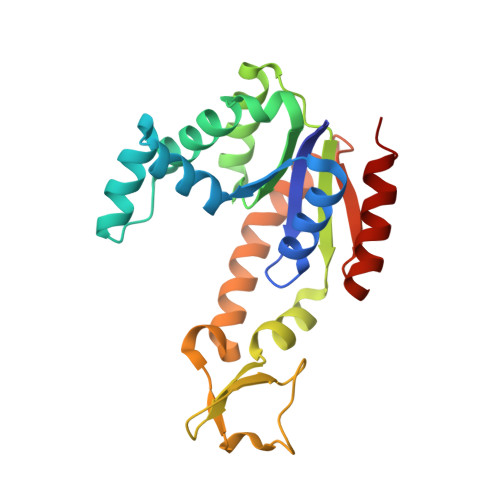Adenylate kinase from Streptococcus pneumoniae is essential for growth through its catalytic activity
Thach, T.T., Luong, T.T., Lee, S.H., Rhee, D.K.(2014) FEBS Open Bio 4: 672-682
- PubMed: 25180151
- DOI: https://doi.org/10.1016/j.fob.2014.07.002
- Primary Citation of Related Structures:
4NTZ, 4NU0 - PubMed Abstract:
Streptococcus pneumoniae (pneumococcus) infection causes more than 1.6 million deaths worldwide. Pneumococcal growth is a prerequisite for its virulence and requires an appropriate supply of cellular energy. Adenylate kinases constitute a major family of enzymes that regulate cellular ATP levels. Some bacterial adenylate kinases (AdKs) are known to be critical for growth, but the physiological effects of AdKs in pneumococci have been poorly understood at the molecular level. Here, by crystallographic and functional studies, we report that the catalytic activity of adenylate kinase from S . pneumoniae (SpAdK) serotype 2 D39 is essential for growth. We determined the crystal structure of SpAdK in two conformations: ligand-free open form and closed in complex with a two-substrate mimic inhibitor adenosine pentaphosphate (Ap5A). Crystallographic analysis of SpAdK reveals Arg-89 as a key active site residue. We generated a conditional expression mutant of pneumococcus in which the expression of the adk gene is tightly regulated by fucose. The expression level of adk correlates with growth rate. Expression of the wild-type adk gene in fucose-inducible strains rescued a growth defect, but expression of the Arg-89 mutation did not. SpAdK increased total cellular ATP levels. Furthermore, lack of functional SpAdK caused a growth defect in vivo. Taken together, our results demonstrate that SpAdK is essential for pneumococcal growth in vitro and in vivo.
Organizational Affiliation:
Department of Biological Sciences, Sungkyunkwan University, Suwon 440-746, Republic of Korea.















